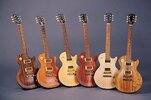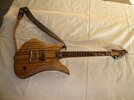S
skuNk.at.ktn
Registrierter Benutzer
Hallo liebe Gitarristen-Gemeinde!
Ich weiß leider nicht ob das eher ins Off-Topic Forum sollte
Wie seht ihr als (Hobby-)Gitarrenbauer und natürlich Gitarristen das Thema "Regenwaldhölzer und andere Exoten"?
Bin beim besten Willen kein Moralapostel und besitze selbst Gitarren aus Mahagoni usw.
Da ich aber die Abholzung von Regenwald für moralisch verwerflich halte, wollte ich euch fragen wie ihr dazu steht.
Anlass zu diesem Thread ist ein Artikel den ich gefunden habe - dürfte den ein oder anderen interessieren.
Dabei geht es sowohl um Alternativhölzer für die Produktion als auch um Stellungnahmen von Gibson.
Liebe Grüße skunk
Ich weiß leider nicht ob das eher ins Off-Topic Forum sollte

Wie seht ihr als (Hobby-)Gitarrenbauer und natürlich Gitarristen das Thema "Regenwaldhölzer und andere Exoten"?
Bin beim besten Willen kein Moralapostel und besitze selbst Gitarren aus Mahagoni usw.
Da ich aber die Abholzung von Regenwald für moralisch verwerflich halte, wollte ich euch fragen wie ihr dazu steht.
Anlass zu diesem Thread ist ein Artikel den ich gefunden habe - dürfte den ein oder anderen interessieren.
Dabei geht es sowohl um Alternativhölzer für die Produktion als auch um Stellungnahmen von Gibson.
Quelle: http://www.tonic.com/article/gibson-guitars-receivesguidance-rainforest-alliance/
In 2009, the US Fish & Wildlife Service uncovered some rosewood from Madagascar in the Gibson USA production facilities in Nashville, Tenn. The legality of the wood is still pending, however Gibson Chairman and CEO, Henry Juszkiewicz, is making sure the company doesn't run up this tree again.
Gibson has joined forces with the Rainforest Alliance for help with their legality issues and to receive guidance on their wood sourcing. The goal is to eventually source from only Forest Stewardship Council (FSC) certified forests. Gibson has also set product control measures to rid itself completely of any illegal wood coming through its supply chain.
The guitar company is banning future purchases of ebony or rosewood from Madagascar, requiring all purchases to be from documented legal sources and trying to implement alternative resources such as composite materials and recycled woods.
In their efforts to move toward a completely FSC-certified supply, the Gibson Foundation has provided $240,000 in support for community, indigenous and smaller enterprises working toward FSC certification in Guatemala, Honduras, Nicaragua, Peru and Bolivia.
Knowing those sweet guitar riffs could be coming from illegal, environmentally damaging sources can quickly turn a note sour. Gibson's collaboration with the Rainforest Alliance and the company's continuing efforts to source sustainably may, in the words of The Beatles, take a sad song make it better.
Quelle: http://www.gizmag.com/eco-friendly-guitars/11918/
Good music needs good wood
Recently Greenpeace shared its fear that the Sitka spruce was being harvested to oblivion with the major guitar makers. The Sitka spruce became the soundboard material of choice for pianos and guitars after the demise of the Adirondack in the 1940s. Whilst much of the logged Sitka ends up in Asia for use in house building, it is the guitar makers who are working together to help ensure its survival. Music wood is only a small part of this problem, but it can be a big part of the solution.
All the big names are involved. Gibson, Martin, Taylor, Fender, Guild, Yamaha, Walden, along with luthiers and wood producers. They've all pledged to help the music industry in its transition to FSC approved wood.
The heavy burden of responsibility for all this forest loss also stretches down to us, the buyers. It's up to us to ensure we buy only from sustainable sources and look out for the FSC label. Gibson USA is aiming to use sustainable wood in 80% of its guitars by 2012 and Martin recently unveiled the 100% FSC certified D Mahogany. And with Taylor, Fender and Yamaha also getting in on the act, finding that future-friendly, sustainable guitar should start getting easier and easier.
But as a guitarist looking to make the transition from earth-harming Guitar Zero to tree-friendly Guitar Hero, is the use of instruments made from sustainable wood the only option?
Ever heard of flaxwood?
Flaxwood is completely new and is produced by breaking down non-endangered European spruce and binding it with a special polymer which ensures consistent tonal integrity. This material is then injection-molded to form the neck, body and back-plate/resonator.
The finished product is fully recyclable. It can be melted down and used to produce new guitars (which is what happens to guitars that don't pass the company's strict quality control). The nut is teflon-based and the inlays are celluloid.
As no exotic wood is needed, the initial transport footprint is greatly reduced. The unique production method also means no waste from cut-offs - anything that isn't used the first time round is simply melted down and used again.
The makers claim their Flaxwood guitars have "the stability and uniformity of graphite but with a warm woody sound". No idle boast either, as the Liekki model has just received a 5-star review (the awarding of which is rarer than Brazilian rosewood) in Premier Guitar magazine's June 2009 issue. Reviewer Pat Smith had this to say, I have played guitars many times the cost of these that can't touch them for playabil-ity, fit or finish. The sound is good and versatile, and the neck is probably the best feeling neck I've ever had my hands on. I would encourage you to seek one out and try it for yourself.
siehe auch: http://www.zeroimpactguitars.com/Home.html
Liebe Grüße skunk
- Eigenschaft



